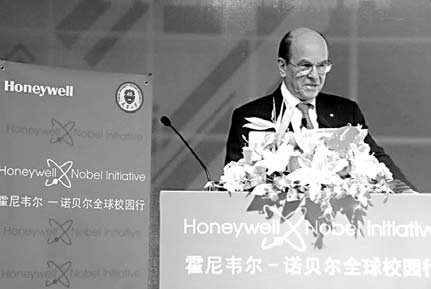


In the picture, Professor K Barry Sharpless, the winner of the 2001 Nobel Prize in Chemistry, is lecturing students and teachers at Tianjin University on "How to Find Something New". In it, the American explores the intricacies of scientific discovery and discusses why creative and open minds have always been essential.
"As a scientist, you may have the fortune to come across something new. But good luck favors only the prepared mind," Sharpless says.
During his two-day trip in Tianjin University in November, Sharpless stayed with students and teachers from the school.
"Nobody can decide what you may meet next minute, so you should prepare to welcome all the unplanned and unexpected discoveries," he said. The 67-year-old professor encouraged students to keep their eyes open to the world around them. "Keep creating, and you can make your own luck."
Sharpless said the trip was an exciting experience and he was glad that due to their high-level educations he could talk directly with the Chinese in English to share views about life without translation.
Sharpless was one of the Nobel Prize winners invited by the "Honeywell-Noble Initiative" to share their experiences with scientific research and personal life with students from universities all around the world.
Started in 2006 with the cooperation with Nobel Foundation, the program has support from Honeywell International to strengthen relationship between young scientists and Nobel Prize winners.
It has been held in the United States, as well as India, Russia, Japan and China - all of which are also markets in Honeywell's global business strategy.
"Creative minds are also increasingly necessary and urgent in emerging markets," says Shane Tedjarati, Honeywell's global vice president and China and India president.
The Tianjin University lecture was the third one for Honeywell China, after one in Beijing University of Aeronautics and Astronautics and at Shanghai Jiao Tong University.
To Honeywell, a leading diversified technology and manufacturing giant, the program helps provide a talent supply pipeline, according to Tedjarati.
He adds that for many years, the company realized large business development in Tianjin, the focus of the country's next development engine in the Binhai New Area.
Tedjarati says Honeywell would further cooperate with Tianjin University to improve its R&D capability.
Set up in 1895, Tianjin University was China's first institution of higher learning. For over 110 years, it has grown to be one of the country's key educational bases, focusing on integrating engineering and technology with sciences, liberal arts, business, as well as law.
(China Daily 12/22/2008 page8)













